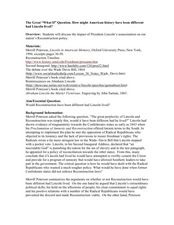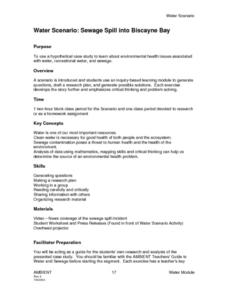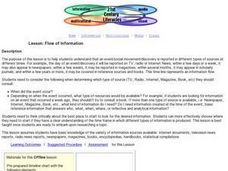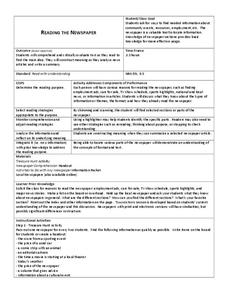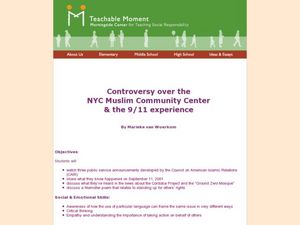Curated OER
Voting Systems
Students view many viewpoints on Britain's voting systems. Students compare/contrast various forms of electoral systems. Students trace the steps to proportional representation.
Curated OER
Strike! Citizenship 11-14/KS3/Levels E&F
Eleventh graders draft a speech to last only one minute. It should explain their personal view on strikes and be designed to persuade others.
Curated OER
The Jubilee Celebrations
Students read comments about the Queen's Jubilee made by children and get into groups to rank the comments in order of how much they agree with them. They then cut out each comment so that they can move them around more easily and stick...
Curated OER
Lights, Camera, Campaign
Pupils employ their technology skills to produce campaign commercials. In this political campaign lesson, students discover the appropriate uses of video cameras and create fictitious campaign commercials.
Curated OER
Sybil Ludington's Ride - a poem
Fourth graders examine the role a teen from the Hudson Valley played in the American Revolution. They view the map of Sybil's ride and calculate the distance using the map's legend.
Curated OER
Today's Specials
In this healthy heart nutrition worksheet, students substitute heart-healthy foods for the high cholesterol choices shown. The purpose is to encourage nutritious choices.
Curated OER
Putin: 'No way back' from democracy
Imagine a meeting between President Bush and Putin. Get your class thinking about global awareness, democracy, and totalitarian modes of government. They examine how two leaders approach major governmental issues and run their countries...
Curated OER
Documenting Texas Women’s History through Photographs
Students explore women’s history. In this women’s studies instructional activity, students will examine seven photographs that depict prominent female figures from Texas’s history. Students will engage in a discussion of the photographs...
Curated OER
Spanish Colonials Encounter Quechan Culture
Students use primary sources from the de Anza expedition of the 1770's to research colonial encounters with the Quechan people from Yuma Crossing, Arizona.
Curated OER
Basic Visual Language
Students gain knowledge of the basics of visual communication. They are introduced to the three fundamental elements of visual language. Those are: camera angle, lighting, and compositions. Students video each other from different angles...
Curated OER
Zero tolerance may add up to problems
Students research the issue of zero tolerance for students to have guns in schools. They realize the difficulties the schools and law enforcement officials face dealing with the issue.
Curated OER
Numbers Scavenger Hunt
Students use computers and Internet to research specified topics using given sites. They print the researched information, and create a PowerPoint presentation.
Curated OER
'Song of the South' a racist tune?
Young scholars read the information about the movie "Song of the South" and watch some of the clips. They write their reaction to the proposal to re-release the movie. Students consider whether it would matter if the studio adds an...
Foreign Policy Research Institute
Categories of Cold War Histiography
While the objective is to provide an overview of the Cold War in preparation for further study, this resource addresses the topic at a rather advanced level, and might need its own introductory lesson. The handouts include terms such as...
Curated OER
The Great "What If" Question. How might American history have been different had Lincoln lived?
Eleventh graders study the Presidency of Abraham Lincoln. In this American History lesson, 11th graders analyze documents related to Reconstruction. Students participate in a debate on Reconstruction.
Curated OER
Forming a Code of Ethics
Students discuss and create a code of ethics for their student newspaper.
Curated OER
Sewage Spill into Biscayne Bay
Learners use a hypothetical case study to learn about environmental health issues associated with water, recreational water, and sewage. They use an inquiry-based learning module to generate questions, draft a research plan, and generate...
Curated OER
Flow of Information
Young scholars examine how information follows a linear path. They identify types of sources they need to consult and where it falls in the information flow, simulate the role of historians, and generate a list of sources for a topic.
Curated OER
Research Activity: Grades 10-12
Learners discuss the war in Iraq, Adam Michnik's essay "We, the Traitors," and the notion that we bear a collective responsibility to rise up against oppression, within a modern geo-political context. They each write a research report on...
Curated OER
Reading the Newspaper
Students read the newspaper. In this newspaper instructional activity, students become familiar with the various parts of a newspaper. They read specific parts, highlight important information and summarize what they read.
Curated OER
Structure of Congress
Students examine the structure of Congress. They identify the roles of the Democratic and Republician parties and their leaders. They role play the role of congressmen and pretend to pass new legislation.
Curated OER
Nutrition an Food: Taking Control of What You Eat
Students examine what they eat and how they can improve their health by changing what they eat. They research nutrition and different foods. They also examine new vocabulary words.
Curated OER
Controversy over the NYC Muslim Community Center & the 9/11 Experience
Students investigate the controversial planned mosque at Ground Zero. In this current events instructional activity, students watch 3 public service announcement clips sponsored by the Council on American Islamic Relations and discuss...
Curated OER
Sports Screeners
Students watch videos to discover the amount of physical activity in film and television. They present their findings to the class after viewing a film. They discuss how perceptions in films can influence young people.
















